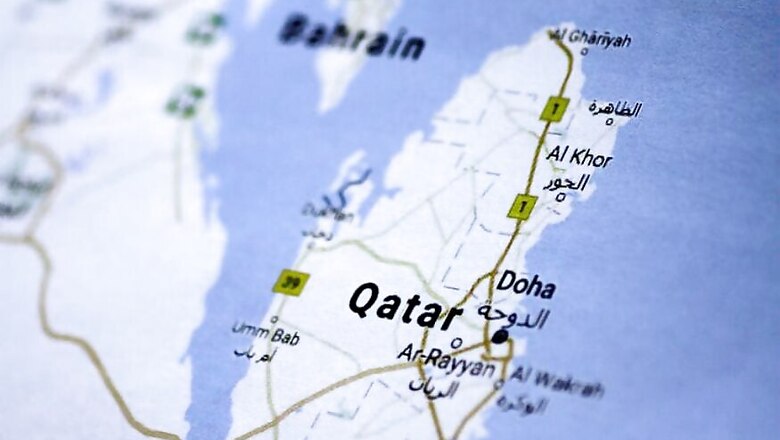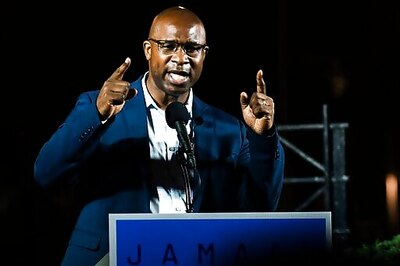
views
Riyadh: Saudi Arabia, Bahrain, Egypt, Yemen and the United Arab Emirates announced on Monday that they were severing diplomatic ties with Qatar, marking fresh escalation of tensions between the Gulf partners over Doha’s alleged support for Islamist militant groups.
Indians make up the largest expatriate group in Qatar, a gas-rich nation that will host the 2022 FIFA World Cup.
A Saudi-led Arab coalition fighting Yemeni rebels announced it was ending Qatar's membership. The coalition said the measure was due to Qatar's "practices that strengthen terrorism, and its support to (terrorist) organisations in Yemen, including Al-Qaeda and Islamic State, as well as dealing with the rebel militias," according to a statement carried by SPA Saudi official news agency.
All the nations also said they planned to cut air and sea traffic to the peninsular country. It wasn't immediately clear how that would affect Qatar Airways, one of the region's major long-haul carriers.
Saudi news agency SPA said Riyadh cut diplomatic ties and closed borders with its neighbour to "protect its national security from the dangers of terrorism and extremism."
Bahrain news agency said the tiny kingdom was cutting ties with Doha over its insistence on "shaking the security and stability of Bahrain and meddling in its affairs." It blamed Qatar's "media incitement, support for armed terrorist activities and funding linked to Iranian groups to carry out sabotage and spreading chaos in Bahrain" for its decision.
Bahrain's Foreign Affairs Ministry issued a statement saying it would withdraw its diplomatic mission from the Qatari capital within 48 hours and that all Qatari diplomats should leave Bahrain within the same period. The ministry's statement said Qatari citizens needed to leave Bahrain within two weeks.
Both the UAE and Egypt made the announcement on their state-run news agencies within minutes of each other.
Qatar slammed the decision saying they were "unjustified" and aimed to put Doha under political "guardianship".
"The measures are unjustified and are based on false and baseless claims," the Qatari foreign ministry said in a statement, referring to the unprecedented steps taken by Saudi Arabia, Bahrain, the United Arab Emirates and Egypt.
"The aim is clear, and it is to impose guardianship on the state. This by itself is a violation of its (Qatar's) sovereignty as a state," it added.
The decision comes after Qatar alleged in late May that hackers took over the site of its state-run news agency and published what it called fake comments from its ruling emir about Iran and Israel. Its Gulf Arab neighbours responded with anger, blocking Qatari-based media, including the Doha-based satellite news network Al-Jazeera.
Doha has long faced accusations that it is a state sponsor of terror. The chief worry among them is the Muslim Brotherhood, a Sunni Islamist political group outlawed by both Saudi Arabia and the UAE as it challenges the nations' hereditary rule.
Gulf countries led by Saudi Arabia fell out with Qatar over its backing of then-Egyptian President Mohammed Morsi, a Brotherhood member. In March 2014, Saudi Arabia, the United Arab Emirates and Bahrain recalled their ambassadors from Qatar over the rift. Eight months later, they returned their ambassadors as Qatar forced some Brotherhood members to leave the country and quieted others. However, the 2014 crisis did not see a land and sea blockade as threatened now.
In the time since, Qatar repeatedly and strongly denied it funds extremist groups. However, it remains a key financial patron of the Hamas-controlled Gaza Strip and has been the home of exiled Hamas official Khaled Mashaal since 2012. Western officials also have accused Qatar of allowing or even encouraging funding of Sunni extremists like al-Qaida's branch in Syria, once known as the Nusra Front.
It has been also been criticised in some quarters for its support of rebel groups fighting Syrian President Bashar al-Assad, and Qatari individuals have also been sanctioned by the US Treasury for terror-funding activities.
In recent weeks, Qatar has been accused outright of terror funding in articles which have appeared in the American media.
It was also criticised for providing a sanctuary to former Hamas chief Khaled Meshaal, who earlier this month used his Doha base — where he has lived in exile for several years — to launch a new policy document.
The Afghan Taliban opened an office in Doha in 2013.
Qatar is a member of the US-led coalition to defeat the Islamic State group.
The country is also home to the Al-Udeid airbase, where the US conducts all coalition air operations for the region.




















Comments
0 comment